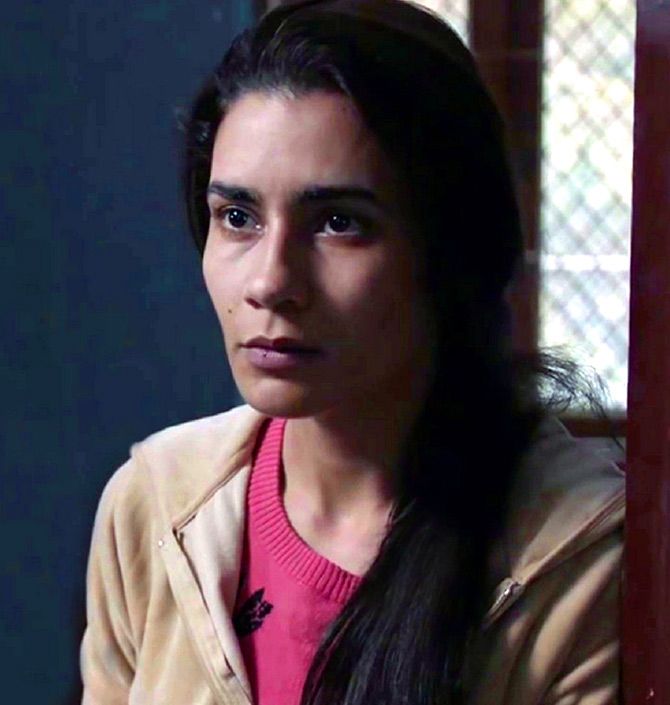'Soni is a soft treatment of a very complex subject,' feels Sreehari Nair.

One tweet proclaims Ivan Ayr's Soni 'the only kind of film I want to watch'.
To this, a reply: 'Only those who like Salman Khan's films wouldn't like this one.'
I am not in favour of putting down Mr Khan's whole filmography in one swoop.
But I wouldn't be much interested if his were the only kind of films, any more than I would be interested if all films were like Soni.
What of the other kinds?
It is great to know that so many people feel so passionately about the issues raised by Soni. I haven't heard a negative peep thus far.
My question, then: 'Why is this huge mass of evolved social thinkers so 'inadequately' represented in the film?'
Ayr's movie tells the story of two lady police officers in Delhi, who become one another's support system, and who help each other wade through an environment of 'toxic masculinity'.
It is about how each contributes to the development of the other's female consciousness.
The senior officer, Kalpana (Saloni Batra) has feelings for her subordinate Soni (Geetika Vidya) that border on maternal.
Kalpana is protective of Soni because Soni embodies everything Kalpana isn't.
On the other hand, it is Kalpana's approval that Soni most seeks -- whether at duty or on the subject of her favourite roadside tea.
Purely based on how its narrative spools out, the film can be viewed as a coming-of-age tale of a mother-daughter pair.
But, but, except for the two leads, there is hardly anyone in the movie worth empathising with -- mostly stock characters that evoke stock outrage.
The technique of the film works tirelessly to expunge this deficiency.

Soni is presented as a series of unbroken, unedited sketches (Almost every scene is a long shot which means that aside from inserting those smart snatches of aural tidbits, the editing of the film would have amounted to placing the shots end to end).
The cunning of this documentary style is that it gives everything in the movie the appearance of 'unvarnished truth'.
However, look beneath the surface and specifically to the characters and the attitudes that the film is railing against -- and you will see that they have all been made soul-less and outdated.
So there is the stereotypical aunty-character who pokes her nose into the lives of Kalpana and her husband, enquiring in a whispery tone (a perennial favourite of the faux-realists), about why the couple is, as yet, childless.
And when this curious woman says with a snide smile that she doesn't mind giving away her gynecologist's phone number, her part of the frame just stops mattering to us.
The cinematic technique may be aiming to make that moment alive, but the character of the nosy aunt hasn't evolved beyond the script: She has died on the page.
With regard to the documentary style then, Ivan Ayr is, in essence, only giving his strong subjectivity the veneer of factualism. I don't know about you, but I believe there's something morally offensive about this approach.
In another scene, when Soni confronts a naval officer who is drunk and behind the wheel, he behaves so terribly with her that we know a slap would only be befitting.
And slap him, she does.
But the whole thing then turns into unbearable melodrama when nobody, absolute nobody, except Kalpana, is shown to think that Soni was correct in doing what she did.
I suppose Ayr is out to suggest that conscience has completely evaporated from the face of the Delhi-NCR region. And given how intellectuals in my city are reacting to the film, perhaps all that lost conscience now beats down upon Mumbai.
It isn't among the film's merits that throughout Soni, we in the audience are left with no doubt about whom to support.
Less realistic and more programmatic, the movie privileges us to see 'right' and 'wrong' more clearly than the characters it wants to antagonise (which is mostly everyone except Kalpana and Soni).
The lechers, for example, are all confident in their lecherdom, and they are living it up: Growling, wisecracking, heckling the two women, the lechers are doing everything they can to diminish their own personality.
How can we not hate these uncultured slobs?
Personally, you may find certain characters conservative, patriarchal, or misogynistic, but if you deny them their three-dimensionality, if you make them so readily detestable, you are doing nothing to make an audience more familiar with the complex space these characters are occupying -- which is the purpose of art.
When you watch a Thondimuthalum Driksakshiyum (probably the most important artistic work to come out of India in the last decade), you feel like you are in the centre of moral chaos, stripped off your quick judgment.
For at the other end of the film, is a director giving you a portrait of a system where no one is an outright hero or an outright swine.
They are merely trying to be better versions of their nature -- and *that* is only complicating matters, further.
Soni, on the other hand, is a soft treatment of a very complex subject. And the film's frequent lunges at hyperrealism, its forced pauses and silences, only help to dress up the fact that this is prefab cinema on the side of all our good angels.
It allows us to maintain the distance we already have with issues such as patriarchy, mistreatment of women, sexism etc and is yet another work that proves it takes more than just 'liberal kindness' to make a good movie.
As calculating as the film's style is, the really effective bits occur when this style lets patterns and insights naturally emerge.

The sound design is a thing of beauty: Bits from radio, news bulletins, bhajans, and wireless messages, as also the murmurings of people expressing their quick contempt, constantly punctuate the primary narrative, lending the film a parallel consciousness.
One scene has Soni, who is growing increasingly desperate about the state of women's safety in the country, turning on the radio and from it pops out news of Modi lauding India's scientific innovators.
I got the feeling that Soni became a better film, every time it just stepped back from its position of outrage, and tried to absorb more of its setting.
In the way Kalpana and her commissioner husband Sandeep sit across each other in his office, you can sense the sexual tensions between them poking out of their official attire.
Soni's neighbour, an old lady, is allowed to express her point-of-view that all good things existed in the past.
The above are instances that give you more to think in regard to the issues that the film wants to take on.
But when Soni merely deifies one half of the frame and demonises the other half, it seems to be softening up as a work of art. Because all that this sensibility does is loosen the film's grip on the viewer who is permitted to walk out congratulating himself.
The mood then turns nauseatingly gay: 'Society is impotent, and I am a positive standout because I identify with the plight of these women better than anybody on screen.'
As I see it, the direct result of putting the viewer in such a self-congratulatory mood is a movie like Simbaa where the term 'rapist' was used with such abandon that one was compelled to surmise that all rapists are perhaps affiliated to a single group named The Rapists Association of India.
The issue of women's safety is real but equally true is the fact that the larger sentiment today is of cognisance for this issue (It is not a tiny little aspect of our life anymore.)
What is also true is that this country is experiencing a period of radical feminism; of women searching for their social, economic and sexual freedom.
My problem with Soni is that it doesn't show any awareness about such a phenomenon actually taking place here -- in this sense, it seems not 'of this world'.
The silence and the brooding of the film's title character suggests she is two cycles ahead of the social order; but to me, the film felt two cycles behind time. (And such a skewed representation is always preferable for our thinkers because it gives them a handle to play the Oppressor Vs Oppressed game: the only narrative they truly understand).
The plain fact of life is that we don't improve but evolve (Think about it: Our generation is less sexist than our parents' and our children will hopefully be better than us on this front).
And the consequence of the women's liberation movement or of the fight for any kind of equality can never be a 'capsize' or a 'flip'.
You begin from a new foundation and then it takes forever to adjust itself because your old inhibitions and beliefs don't fade away at the snap of a finger.
The responsibility of art then, when it tries to take on such key issues of our time, is to first acknowledge that there's indeed a movement for change happening and then dissect the contradictions and confusions of this new civilisation. (Good art drives change by playing the role of the anatomizer and not the finger-wagger).
This is a responsibility Soni only partly undertakes (An incident at Kalpana's police station involving a case of a false rape charge does not count because it feels inserted to prove moral equivalence on the subject of rape: 'Oh men get trapped too' -- which really is not my point).

The film's lone three-dimensional character is Soni's estranged husband Naveen, who outwardly plays the sort of man we know -- the sort who keeps deluding himself and the world with statements like 'I have got the perfect business plan. Yes! This time!'
Naveen feels real because he stands for the perplexities of a rapidly changing social order. He is the scared male; a man who is growing progressively more and more bewildered about his position on the domestic scene, and by extension, in society.
My guess is that this scared, under-confident man is a character Ivan Ayr didn't much identify with, starting out, and he is one that Ayr had to warm up to slowly.
This explains why Naveen's scenes breathe more freely, and why the character feels like the product of an exploration, and not a mere illustration of an idea figured out well in advance.
One of the worthy goals of art -- and this is why good art is a rare thing -- is to expend some effort to be honest about the shortcomings of one's own position, and look for human possibility in 'the other.'
The kind of art that grows out of such a goal may not fortify your existing beliefs, in the way that Soni does.
It will, however, reveal to you something far more significant -- that we are, all of us, in this together: That the Police are us; the Criminals are us.













 © 2025
© 2025